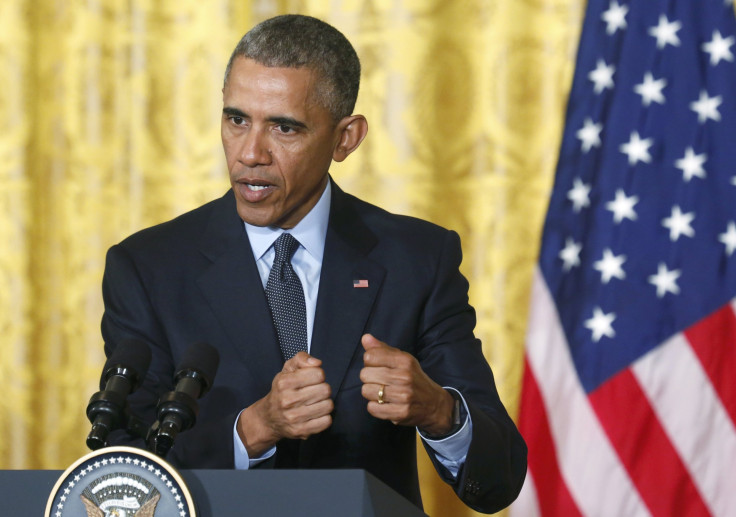Marijuana Legalization: President Obama, US Senators Offer Support For Medical Cannabis On CNN's Sanjay Gupta Documentary 'Weed 3'

President Barack Obama offered qualified support for efforts made in the U.S. Senate to decriminalize medical marijuana during an interview for CNN's documentary "Weed 3: The Marijuana Revolution," which will make its debut Sunday night. Hosting the program is Dr. Sanjay Gupta, the network's chief medical correspondent.
Gupta asked the president his opinion of the proposed Carers Act of 2015, a Senate bill that would change federal law regarding state-legal, medical-marijuana programs. The bill would allow states to legalize marijuana for medical use without federal interference, increase research into marijuana's medical benefits, and reclassify its status as a dangerous drug. Obama replied:
"You know, I think I'd have to take a look at the details, but I'm on record as saying that not only do I think carefully prescribed medical use of marijuana may in fact be appropriate and we should follow the science as opposed to ideology on this issue, but I'm also on record as saying that the more we treat some of these issues related to drug abuse from a public-health model and not just from an incarceration model, the better off we're going to be."
Introduced in March, the Senate bill seeks to classify marijuana not as a Schedule I substance but as a Schedule II substance under the Controlled Substances Act (CSA), which has five different categories of drugs and drug ingredients. The reclassification would give scientists more freedom to experiment with marijuana as a medical treatment.
Although 23 states have legalized marijuana for medical purposes, the federal goverment has for decades had it designated as an illegal Schedule I substance -- alongside heroin and LSD. However, many studies have shown marijuana's possible medical benefits, from alleviating chronic pain and halting the progression of Alzheimer's disease to reducing seizures.
During the documentary, Gupta also spoke with two of the co-sponsors of the proposed Carers Act of 2015 -- Sens. Cory Booker, D-N.J., and Kirsten Gillibrand, D-N.Y. -- and the program host said both were "very optimistic about it."
"People have been trying to do variations of this for 40 years, 50 years. I asked them, 'Why is this different?'" Gupta told International Business Times. "They really feel that there’s a revolution sort of feel, both from the lay public as well as the scientific community. What they’re asking for, while it’s audacious compared to where we are now, it’s very much common sense."
Gupta added that the three senators who originally co-sponsored the bill, a group that includes 2016 presidential candidate Sen. Rand Paul, R-Ky., are putting a great deal of their resources behind the bill.
"Cory Booker’s exact language is 'We're gonna get it done,'" Gupta said. "That may sound like some simple language, but there's a lot behind that because it came after me pushing him about why this time was different and how they were going to get it done this time. And I reminded them that people tend not to win elections on this issue, they lose elections on this issue. But these senators are really putting their weight behind this."
Echoing Obama, Dan Riffle, director of federal policies for the Marijuana Policy Project, told the Huffington Post that the regulation of legal marijuana could be done in the same way the U.S. regulated tobacco -- without criminalizing it and while offering public education about its dangers.
"That would require moving marijuana out of the Controlled Substances Act's list of schedules altogether, just like tobacco, and instead using taxes, honest education and sensible regulations. That's what's working in Colorado now, and what every major poll shows the majority of Americans are ready to do," Riffle said.
Aside from its impact on public health, decriminalizing marijuana would cut the staggering number of U.S. prisoners incarcerated for nonviolent drug possession or distribution. In 1980, there were about 40,000 drug offenders in U.S. prisons, according to research by the Sentencing Project. In 2011, the comparable number was more than 500,000. Along this line, Obama has spoken before about his desire to remove criminal penalties for nonviolent drug offenders.
© Copyright IBTimes 2024. All rights reserved.






















